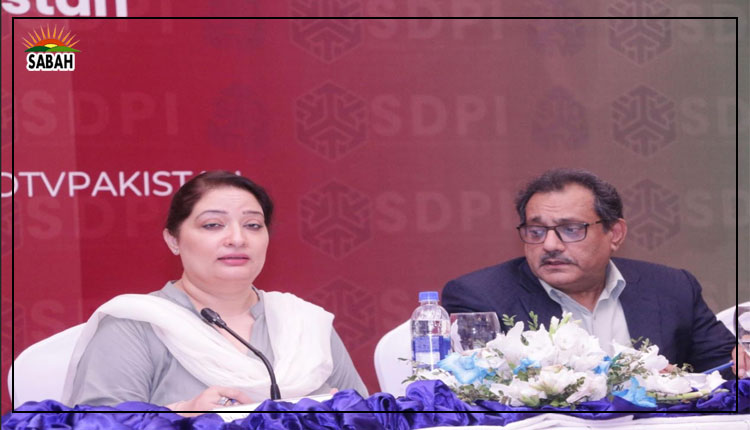No one is left behind’ for Inclusive economic growth: Speakers
ISLAMABAD, Sep 26 (SABAH): Romina Khurshid Alam, SAPM and Convener Parliamentary Task force on SDGs, urged for strengthening implementation of laws along with behavioural changes to reinstate respect for law, social responsibility and social norms to ensure that development is inclusive and reaches under-developed and underprivileged communities.
Speaking at a roundtable discussion on ‘Inclusive economic growth: An imperative for sustainable economic development’, she said that bureaucratic operations must be simplified through one window operations so that the development agendas are delivered timely and efficiently. She stressed that developed countries which are major contributors of global carbon emissions must be called out and held responsible for their actions that developing countries are paying for. Climate finance is not aid rather legitimate right of climate vulnerable countries and responsibility of high carbon emitting countries.
Dr Vaqar Ahmed, Joint Executive Director SDPI called for achieving sustainable economic development to overcome contemporary challenges. He said there is a dire need that the government opts for solution-oriented approach, forward-looking planning, and looking at the current floods as an opportunity to reset social protection backed by well thought out targeted economic policies rather than burdening future generation with loans. Frequent changes in tax, tariffs and reversals of economic policies have long term negative implications and discourage foreign direct investments. Pakistan needs to diversify foreign investments from multiple countries.
Dr Shafqat Munir Ahmad, Head Sustainability and Resilience Programme, said that economic inclusion of vulnerable and marginalised segments is critical to ensure that growth does not exacerbate existing inequalities in society. It is imperative for economists and policy makers to identify the issues of socio-economic inclusivity and rectify them to ensure sustainable economic development that benefits and empowers all strata of society. He called for strengthening state-citizens cordial relations.
Dr Sajid Amin, Deputy Executive Director SDPI, Pakistan is currently confronting 4 major challenges preventing it from achieving sustainable and inclusive economic development. These include balance of payment crisis, high and unsustainable economic growth, recurrent climate disasters and political and economic uncertainty and instability. He said that it is crucial to shift focus of economic policies to SMEs and entrepreneurship which can create employment resulting in inclusive economic growth.
Ali Salman, ED PRIME Institute said that Pakistan’s-economic policies have been fairly inclusive bearing in mind the fiscal constraints. Despite different models, no government ever shied away from development agenda. No strong commitment to develop industry and agriculture is the reason to low GDP share and employment ratio. Taxation and tariff regimes should be uniform across sectors to create a level playing field for investments and growth in each sector.
Dr Aasim Sajjad, said that economic development is impossible without recentring resources redistribution policies. He criticised that ignoring natural watershed management in infrastructure development is a leading cause of flooding; and developments in the name of tourism cause environmental degradation, loss of habitats and biodiversity, but most importantly catalyse melting of glaciers in Northern areas.
Moazzam Bhatti, Director Advocacy SDPI said that lack of quality data and access to think tanks, economists, and policy makers distorts analysis and leads to inefficient economic policies. He called for improving comprehensive coordination between federal and province governments and ensuring continuity of economic policies.
Dr. Neelum Nigar, Director, Institute of Strategic Studies, stressed taking a gender perspective in socio-economic policies as women are at the centre of economic crisis and climate disasters. Despite being almost half of population, there is low representation of women at high-ranking positions of power which reflects in policies that are devised without envisioning through gender lens. Dr Abdul Jabbar, Assistant professor Economics, IIUI said that despite employing 40% of labour force, agriculture contributes to only 20% of GDP.
He said development of agriculture sector and rural development are important as only 3% private sector capital is available to agriculture sector leading to low investments, human capital, and R&D. Iftikhar Ahmed, Assistant professor PIDE urged for a dialogue among politicians, policy makers and economic experts on economic policies that can support sustainable development.
Dr. Abdul Jalil, Professor PIDE criticised governments for adopting short term cosmetic interventions and inconsistent economic policies which are root cause of current economic challenges. Dr Saddaf Yasir, CEO Skyians suggested replacing capitalist economic policies with Islamic policies to uplift the vulnerable communities. Muhammad Faisal Khokhar, Director, Board of Investment, suggested forensic audit of public enterprises, ministries and departments to identify the scale of losses and devising targeted remedies to minimise these losses and shift finances towards sustainable economic development.
Dr Saud Ahmed Khan, PIDE drew attention to focusing on disaster preparedness rather than devising strategies after a calamity has struck. He said that the government must raise the plight of victims of climate disasters strategically on all international forums. Khurram Elahi, Lecturer PIDE called for productive use of digital technologies that can benefit in skill development and labour productivity rather than entertainment centric digitalisation.
Ermeena Malik, technical Advisor World Bank suggested formulating comprehensive yet complex interventions to strengthen state owned enterprises and regulatory bodies especially in energy sector to transform the sector. Ayesha Ilyas, coordinator Advocacy and Outreach, SDPI, drew attention to the fact that desperation and despair among flood victims is rising which will lead to higher gender violence and crime rates if they are not provided timely relief.












